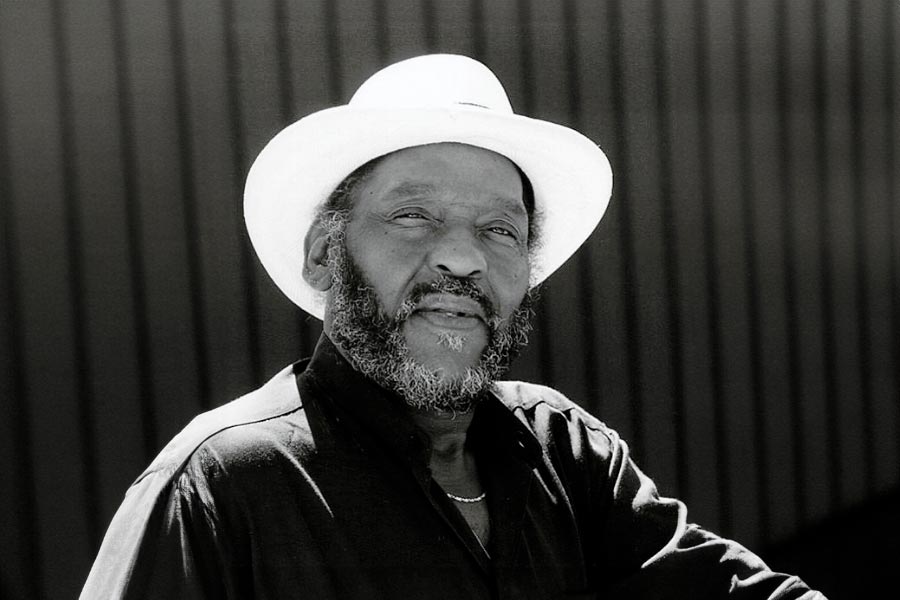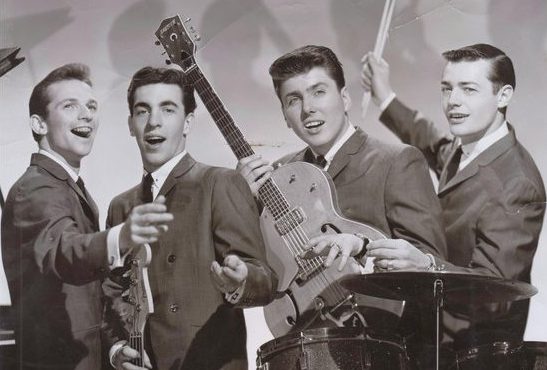At the age of 50, a second career in music beckoned established guitarist Mel Brown and found him relocating from Texas to Canada for a 20-year career making and supporting music in Kitchener, Ontario.
Mel Brown was born to a musical family in Jackson, Mississippi on October 7, 1939. His father was an old school music teacher, who took a hands-on approach to imparting music theory on his children. He’d give the boys a note, and have them identify it in its register, while they held their hands out, in case they called the wrong note.
Brown contracted meningitis when he was 14, when his father brought the bedridden teen a Gibson Les Paul guitar. Brown studied the instrument and later described his sense of elation when he grasped music. He joined The Duke Juniors, a young musical farm team for the popular Jackson band The Duke Huddleston Orchestra.
Sonny Boy Williamson hired the teen for local shows when he arrived in Mississippi needing a guitar player. Brown made his way west for the first time to further his music career.
Electro Fi Records’ website quotes Brown saying “I’d been around cotton fields all my life, so when I heard a couple of guys who played so much better than me I decided to go back to Mississippi and practice some more.”
Having presumably improved to his satisfaction, Brown headed back west and found his way into Johnny Otis’ band and TV show. He found more work backing The Olympics who were touring on the strength of their hit “The Hully Gully,” and Brown started playing for fellow Johnny Otis alumnus Etta James.
Road life didn’t suit Brown though, and luckily L.A. had tons of local music jobs from stages to studios. He landed a spot in the house band at the popular Club Sands where Brown backed many future jazz and blues legends. He also played on sessions for pop artists like Doris Day.
It was a mix of funky jazz and blues that Brown recorded most often, with many blues stars – BB King, Lightnin Hopkins, T-Bone Walker to name just a few – and the latter invited Brown to record.
The T Bone Walker sessions led to a recording deal with ABC Records, and Brown’s debut album, Chicken Fat, came out in 1967 on Impulse, ABC’s jazz subsidiary.
His Impulse albums are popular among jazz and funk collectors. He recorded a half dozen albums in about as many years. Brown continued working on other ABC artists’ albums through the 1970’s before relocating to Nashville and then Texas.
Brown was also busy backing Bobby Blue Bland. Mick Jagger asked him for an introduction to Bland, which turned into the singer hiring Brown for the next decade.
During a stint playing in Denver in 1975, Brown met Miss Angel, with whom he lived for 13 years before they married. They left Nashville when Brown went to work for the house band at the popular Austin venue Antone’s in 1983. That gig was preempted some 5 years later when Kitchener club owner Glenn Smith, in Austin scoping music talent, offered Brown a gig at his club, Pop the Gator.
Once in Ontario, Brown established himself on a semi-local blues circuit, but wasn’t in any rush to tour. He continued to release music on independent record labels Antones, Relix and others into the 1990’s. He released a live cassette recorded with The Homewreckers at Pop the Gator.
Brown started recording for the Electro-Fi label in 1999 with Neckbones and Caviar which received the 2001 WC Handy Award for Blues Comeback Album of the Year.
In 2004 he received the Blues With a Feeling Lifetime Achievement Award from the Toronto Blues Society.
Brown recorded with other blues artists luke Sam Myers and Harmonica Shah before releasing Blues – A Beautiful Thing in 2006. This c.d. saw Brown return to some of his jazzier licks that got him on Impulse Records decades earlier.
On March 20, 2009, Mel Brown passed away at the age of 69 from complications related to emphysema. Friends said he loved spending his final decades living in Kitchener. He was willing to share guitar licks and techniques and supported local music in his adopted locale.
At the time of his passing, Glenn Smith, the club owner who recruited him (whose club didn’t last long, but Brown was happy to stay around) called the guitarist a “laid back, smooth consummate blues man.”
A documentary, Love Lost and Found, was released in 2015, featuring interviews about Mel Brown with players like Buddy Guy was streamed but now seems available on DVD only.
Later this year, May 27 -29, Kitchener will host its inaugural Mel Brown Music Festival & Symposium at several venues aiming to bring together a diverse group of community participants, the Black music community, creators, youth, scholars and students to raise awareness of Mel Brown’s legacy and his musical influence on the Kitchener/Waterloo region.
The Jazz Room, The Museum, Kitchener Public Library, and Maxwells will host events which will include live performances, workshops and a conference addressing anti-black racism in music education at universities and higher learning institutions.
Here are a few links to Mel Brown, starting with his first single, “Chicken Fat” –
https://www.youtube.com/watch?v=ZzBbonIkLPY
A live clip from Pop The Gator in Kitchener, with The Homewreckers –
https://www.youtube.com/watch?v=tlob0-asGQ4&list=OLAK5uy_k4lcyG4G8WzOO4-4DKf7QZ7PJ-3wTARlg
Other musicians remember Mel Brown –
https://www.youtube.com/watch?v=Xp_8z171uHc
Erik Twight @VeritableInfusion, proprietor of Basil’s Books & Vinyl and Freelance Writer specializing in current affairs, history, photography, and music. He produces a weekly podcast/radio show on CIUT.fm (89.5FM Toronto) arranged thematically and with commentary.



